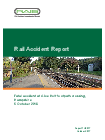Moynoor and Angura Rashid, directors of Salma Cuisine Limited which traded as Salma Restaurant, based in the village of Wingham near Canterbury, have been disqualified from acting as company directors following investigations by the Insolvency Service and HMRC.
Both gave disqualification undertakings to the Secretary of State for Business, Energy & Industrial Strategy, Moynoor Rashid banned for seven years and Angura Rashid for three and a half years.
At liquidation, the company owed in excess of £400,000 to HMRC.
An in-depth HMRC investigation revealed significant suppression of cash takings resulting in a VAT assessment of £85,794 and additional penalties of £52,897 being raised. HMRC also reassessed the company’s Corporation Tax liability to be £135,009.
Mr Moynoor Rashid was also issued with a personal liability notice of £80,967 due to the deliberate suppression of sales income.
Commenting on the disqualification, David Brooks a Chief Investigator with the Insolvency Service said:
The periods of these disqualifications sends a clear message to other company directors that tax abuse of any kind will not be tolerated, especially when takings are channelled to directors.
Much of the public service is funded by the correct amount of taxes being paid. By not declaring and paying the correct amount of taxes, the public has been deprived from receiving the services it deserves from the public sector. The Insolvency Service therefore will not hesitate to remove bosses from the business environment in order to protect the public.
Notes to editors
Moynoor Rashid, 66, and Angura Rashid, 63, were directors of Salma Cuisine Limited, which was incorporated in July 2004.
Moynoor Rashid – date of birth, February 1952 – is of Canterbury, Kent. Moynoor Rashid has been disqualified for 7 years from 11 September 2017.
Angura Rashid – date of birth December 1954 – is of Canterbury, Kent. Angura Rashid has been disqualified for 3.5 years from 19 September 2017.
Salma Cuisine Limited (CRO No. 05168198) was incorporated on 1 July 2004 and was placed into creditors’ voluntary liquidation on 16 September 2016.
One of the main purposes of the Company Directors Disqualification Act is to ensure that proper standards of conduct of company directors are maintained and to raise those standards where appropriate.
A disqualification order has the effect that without specific permission of a court, a person with a disqualification cannot:
- act as a director of a company
- take part, directly or indirectly, in the promotion, formation or management of a company or limited liability partnership
- be a receiver of a company’s property
Disqualification undertakings are the administrative equivalent of a disqualification order but do not involve court proceedings.
Persons subject to a disqualification order are bound by a range of other restrictions.
The Insolvency Service, an executive agency sponsored by the Department for Business, Energy and Industrial Strategy (BEIS), administers the insolvency regime, and aims to deliver and promote a range of investigation and enforcement activities both civil and criminal in nature, to support fair and open markets. We do this by effectively enforcing the statutory company and insolvency regimes, maintaining public confidence in those regimes and reducing the harm caused to victims of fraudulent activity and to the business community, including dealing with the disqualification of directors in corporate failures.
BEIS’ mission is to build a dynamic and competitive UK economy that works for all, in particular by creating the conditions for business success and promoting an open global economy. The Criminal Investigations and Prosecutions team contributes to this aim by taking action to deter fraud and to regulate the market. They investigate and prosecute a range of offences, primarily relating to personal or company insolvencies.
The agency also authorises and regulates the insolvency profession, assesses and pays statutory entitlement to redundancy payments when an employer cannot or will not pay employees, provides banking and investment services for bankruptcy and liquidation estate funds and advises ministers and other government departments on insolvency law and practice.
Further information about the work of the Insolvency Service, and how to complain about financial misconduct, is available.
Contact Press Office
Press Office
The Insolvency Service
4 Abbey Orchard Street
London
SW1P 2HT
Email
press.office@insolvency.gsi.gov.uk
Media Manager
020 7596 6187
This service is for journalists only. For any other queries, please contact the Insolvency Enquiry line on 0300 678 0015.
For all media enquiries outside normal working hours, please contact the Department for Business, Energy and Industrial Strategy Press Office on 020 7215 1000.
You can also follow the Insolvency Service on:
Link: Press release: Last orders for directors after falsely recording cash takings
Source: Gov Press Releases


